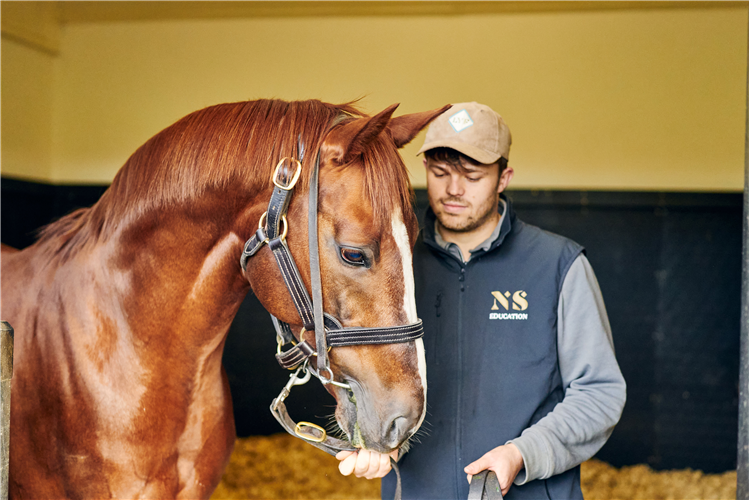3 minute read
The staffing crisis within horseracing remains a constant talking point. Encouraging people to fall in love with the sport is an important stepping stone to solving the problem – yet racing needs to inspire the younger generation to see employment within the industry as a viable and attractive option, especially in the current economic climate.

Whilst there may be a perception that the National Stud are predominantly preoccupied with the business side of breeding, their education programme has the potential to inject new life into the industry. It offers an opportunity for individuals to gain first-hand experience in all aspects of breeding – skills that can be immediately utilised in the workplace.
Last year, the National Stud made an unprecedented move. Their Level 3 Stud Management & Sales Consignment Course, which had previously been held from January to June, was extended in line with the academic year: a twenty-six-week course commencing in September with the sole intention of giving participants a full overview of commercial breeding.
The importance of the change cannot be underestimated in the wider picture of staffing the Thoroughbred industry. Firstly, it encourages school-leavers or university graduates to join the course at a time of the year which fits with the academic programme. Secondly, it gives students the opportunity to experience the previously unexplored facets of consignment and the yearling sales.
The National Stud's Education Manager Abbie Taylor explains how the course works:
"They do two weeks of yearling preparation with us before the October Sales, which gives them the basic skills – they understand prep, they are able to show yearlings in hand and understand the importance of turn-out for a seller and a buyer.
"At the yearling sales, the students are then paired with a consigner for a placement. Not only do they have the opportunity to get paid if they do well, but it also gives hands on experience. It's all about employability - those kind of relevant skills, they need to learn."
'Who you know' will always be an important aspect of a comparably small industry and the National Stud understands that. It is not easy for stud farms and breeders to entrust their livelihood to an unknown and by extending the course, students will have an opportunity to meet and work for, the top players during the sales season.
"It's so hard for people to get opportunities at the sales without someone really taking a risk and taking a chance. If someone walked up to a consigner and said I've never worked the sales before, but I can handle thoroughbreds, the likelihood is they're not always going to get the opportunity.
"We had Castlebridge, Juddmonte, Newtown, Houghton Stud plus many others offer students consignment placements. The feedback was very, very positive and all the students rose to the challenge.
"The consigners were ableThe National Studto differentiate with the students to ensure they were challenged, but also understand they may be lacking in confidence in some areas. They set them up with a quieter yearling or let them groom instead – but by the December Mares Sale, all our students had taken a horse through the ring."
Back at the National Stud, students are thrown into the reality of springtime at a large farm – covering and foaling. The last few months on the programme may include long days and even longer
nights, but there is little doubt that graduates come out of the course with a wealth of practical knowledge.
"The course runs on a one-week rotation around the yard, so the students can access all parts of the stud, including the foaling unit. Between our students, they've completed around 50 foalings already this season with a couple of weeks to go," explains Taylor.
"Our covering shed is brilliant because if confident enough, the students get hands-on time with the stallions, making them generally really competent. The stallion team will let them groom and handle the stallions and they'll attend trips out to other studs to understand how covering works with horses that they really admire – like Frankel and Kingman."
Retention of staff within the industry remains another big talking point, and the inclusion of a part-time option on the National Stud's programme could be a vital lifeline for keeping individuals in the sport.
"The part-time pilot last year was really successful. Some of the individuals are already working in the industry but want to pivot in their roles. They may want to expand their own business to include a broodmare or a foaling service, but they come from a racing background and may not have the skill set to offer.
"Rather than losing them, we're retaining them because they're not leaving the industry to find something else to do. They're staying in the industry and just thinking about how they can expand their business – which is really important in the current economic climate."
It may only be the first year that the course has run from September to April, but it remains extraordinarily successful in offering students a route to employment, with many already securing places.
"We've got a couple going to Widden Stud in Australia, one to France, one to Ireland and one to Japan next year after doing a sales season in the UK for another stud.
"The course has given them hands-on work experience with the horses. They understand that to be able to access a nominations role or stud admin, they need to get a little bit more experience behind them, see some Southern Hemisphere practises and experience more of the world. When they come back into those roles in the UK, they really value the practical side of it."
The National Stud is determined to play its part in encouraging new participants within the sport and Taylor is passionate about positive change:
"Traditionally we've done the same thing for fifty to sixty years. Why aren't we thinking outside the box? The courses need to grow, develop and adapt to match what the next generation requires, but also showcase the community and lifestyle the industry has to offer – because it is amazing."






